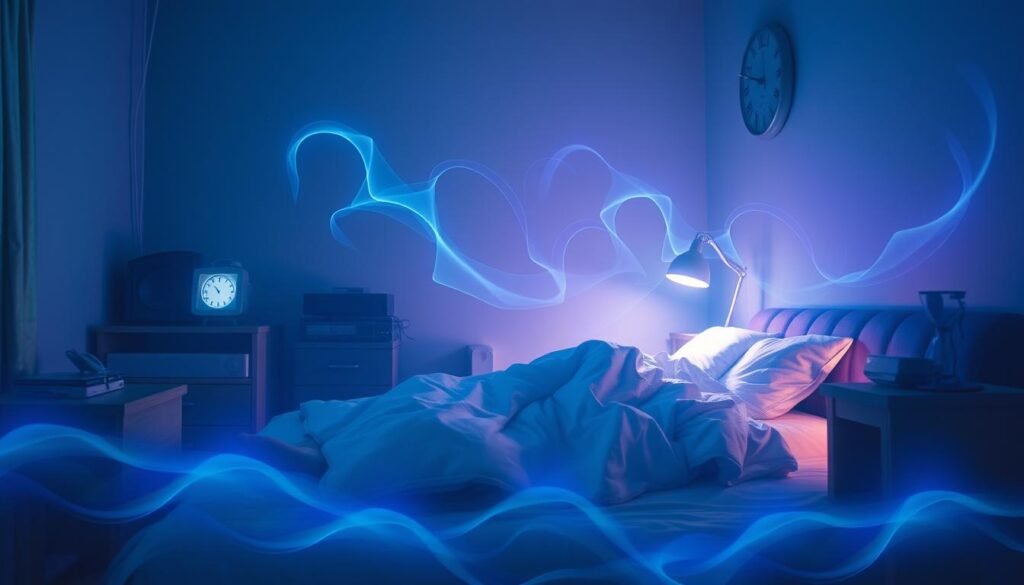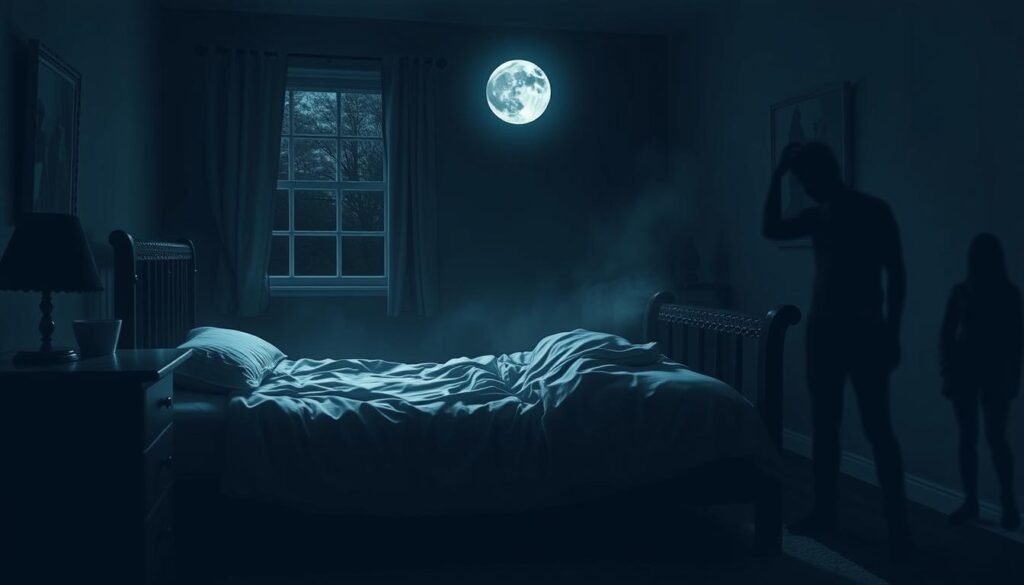About half of cancer patients in treatment have trouble sleeping. This shows how health and rest are closely linked. People facing cancer must understand how radiation impacts sleep. Insomnia means having trouble sleeping for over a month, at least three nights a week. It’s more than just feeling tired; it can make pain worse and slow healing. This guide explores how radiation might lead to insomnia, its causes, and effects on health. It offers helpful information for those struggling with these issues.
Key Takeaways
- Approximately 30-50% of cancer patients endure severe sleep difficulties.
- Maintaining good sleep hygiene is essential for improving overall health.
- Medications related to cancer treatment can contribute to insomnia.
- Insomnia can be either short-term or chronic, affecting patients differently.
- Improving sleep quality is linked to better physical and mental health.
- Sleep problems during treatment may result in longer hospital stays.
Understanding Insomnia and Its Causes
Insomnia is a major sleep disorder. It makes it tough for people to fall or stay asleep. Those with this disorder face daytime fatigue, trouble thinking clearly, and feeling grumpy. Not getting enough sleep harms mental and physical health.
Defining Insomnia and Its Symptoms
Insomnia shows up with various symptoms, different for everyone. The main symptoms of insomnia include:
- Difficulty initiating sleep
- Frequent awakenings during the night
- Waking up too early and being unable to return to sleep
- Daytime sleepiness and fatigue
- Increased anxiety or irritability
Common Causes of Insomnia
A lot of things can trigger insomnia. Stress or anxiety are common causes. Some face it because of health issues. The top causes of insomnia are:
- Psychological factors such as anxiety or depression
- Chronic medical conditions (e.g., cancer, diabetes)
- Medications and treatments (e.g., steroids in cancer therapy)
- Poor sleep hygiene and habits
- Environmental factors (noise, light, temperature)
Impact of Insomnia on Daily Life
Insomnia greatly affects day-to-day life. Lack of sleep reduces productivity and increases the chance of emotional problems, such as anxiety and depression. About 10-30% of adults in the United States have chronic insomnia. The rate is higher among cancer patients. Understanding this helps people improve sleep habits and overall health.
| Symptom | Description |
|---|---|
| Difficulty Falling Asleep | Inability to initiate sleep within a reasonable time frame. |
| Frequent Night Awakenings | Waking up multiple times, disrupting sleep cycles. |
| Early Morning Awakenings | Waking up earlier than desired and struggling to return to sleep. |
| Daytime Fatigue | Feeling excessively tired or sleepy during the day. |
| Irritability | Increased sensitivity and frustration as a result of sleep loss. |
Exploring Radiation Effects on Health
Radiation exposure affects health, especially for cancer patients. It’s key to know the difference between radiation types. Ionizing radiation impacts health more than non-ionizing forms.
Types of Radiation Exposure
There are two main types of radiation: ionizing and non-ionizing. Ionizing radiation, like x-rays and cancer therapy radiation, can damage cells. Non-ionizing, from sources like microwaves, is less harmful. Knowing these differences is crucial for understanding radiation risks.
Health Impacts of Radiation on Sleep
Radiation affects sleep, notably in cancer patients. Studies find that 20-70% of women with breast cancer have sleep problems. Men with prostate cancer report sleep issues as well, with 30-50% affected. These issues stem from treatment, fatigue, pain, and stress.

Sleep problems in cancer patients can increase fatigue, anxiety, and depression. Coping methods play a big role in sleep quality. Strategies focusing on problem-solving predict better sleep. In contrast, avoidance strategies can make sleep worse. Understanding this helps patients manage their health and improve sleep during treatment.
| Type of Cancer | Percentage Experiencing Sleep Difficulties |
|---|---|
| Breast Cancer | 20–70% |
| Prostate Cancer | 30–50% |
Does Radiation Cause Insomnia
It’s important to understand how radiation therapy might affect sleep for cancer patients. Studies show that those treated with radiation may face more sleepless nights. Especially in the early stages, breast and prostate cancer patients often find their sleep disrupted.
Research Findings on Radiation and Sleep Disorders
Clinical studies have shown a clear link between radiation and troubled sleep. Patients usually start having trouble sleeping right after their treatments. The reasons vary from the physical effects of the therapy to the stress of having cancer. Addressing insomnia quickly is crucial because it can deeply impact daily life.
Case Studies of Cancer Patients Undergoing Treatment
Cancer patient case studies show different experiences with insomnia after radiation therapy. However, those who follow certain bedtime routines or relaxation techniques often sleep better. This suggests that while radiation contributes to sleep problems, managing them properly can lessen their impact. Therapies like CBT-I and mindfulness might improve sleep for these patients.

| Cancer Type | Reported Insomnia Incidence | Management Strategies |
|---|---|---|
| Breast Cancer | 30-40% | CBT-I, relaxation techniques |
| Prostate Cancer | 25-35% | Regular exercise, sleep hygiene improvement |
| General Cancer Survivors | 20-30% | Complementary therapies, melatonin supplementation |
The link between radiation and sleep problems in cancer patients offers a chance to help. This area is key for finding ways to support and help patients.
Connection Between Sleep Disorders and Cancer Treatments
Cancer treatments can mess up how you sleep, with troubles like insomnia being very common. Studies show that 30% to 75% of patients with cancer have sleep problems, which is a lot more than in people without cancer. We’ll look at how treatment like radiation therapy changes sleep patterns and compare it to other treatments.
How Radiation Therapy Affects Sleep Patterns
Radiation therapy can really change how you sleep. Many patients have trouble sleeping because they feel pain, nausea, and are very tired. They find it hard to fall asleep and stay asleep, which makes their sleep worse overall. About 30–50% of cancer patients will have symptoms of insomnia.
The time when treatments happen can mess with sleep too. Doctors need to watch how patients sleep closely during treatment.
Comparison with Other Cancer Treatments
Radiation therapy is just one treatment that can affect sleep. Chemotherapy and hormonal therapy also cause sleep troubles. At first, 80% of patients on chemotherapy may not sleep well, but this might get better over time. Hormonal treatments can also make it hard to sleep well. The way each treatment affects sleep depends a lot on the patient and the kind of treatment given.
| Cancer Treatment | Initial Insomnia Symptoms | Post-Treatment Insomnia Symptoms |
|---|---|---|
| Radiation Therapy | Varies by patient | 30-50% |
| Chemotherapy | 80% | 68% (2nd cycle) |
| Hormonal Therapy | – | May exacerbate insomnia |
By understanding how cancer treatments and insomnia are connected, we can help patients better. Managing sleep issues can improve patients’ lives a lot. If you’re having trouble sleeping, talk to a doctor. It can make a big difference in how you feel and heal.
Things that can cause sleep problems during cancer treatment include side effects and feeling worried or upset. For more details on how health issues can lead to insomnia, check out this article.
Sleep Disorders in Cancer Patients
Sleep problems are common in people with cancer. Up to half of those getting treatment may have trouble sleeping. It’s important to look into why this happens to help them better.
Prevalence of Insomnia Among Cancer Patients
Around 30% to 50% of cancer patients deal with sleep issues, especially insomnia. Tumors and treatment side effects can disrupt normal sleep patterns. Pain, tummy problems, and being very tired can also make sleeping hard.
Psychological Effects of Cancer Diagnosis on Sleep
Getting diagnosed with cancer can make sleep problems worse. Anxiety and depression are common and can cause a cycle of sleepless nights. Addressing these feelings is key to improving sleep.
Cognitive behavioral therapy can help reduce anxiety. This, in turn, can make it easier for patients to relax and sleep better.

For more information on cancer and sleep issues, visit this informative resource.
Radiation Therapy Side Effects and Insomnia
Radiation therapy can lead to many side effects that affect sleep among cancer patients. Knowing these effects helps manage conditions like insomnia that come from treatment.
Common Side Effects Impacting Sleep
Common side effects of radiation therapy include fatigue, pain, and stomach issues. These issues often disturb sleep. Insomnia can start as physical discomfort makes sleeping difficult. Treatment can also change normal sleep patterns.
The pain from cancer or its treatments can prevent deep sleep. This leads to more tiredness and crankiness.
Role of Hormonal Changes during Treatment
Hormonal changes from radiation add to the problem. Symptoms like hot flashes and mood changes often start, impacting well-being. These changes can make stress and anxiety worse, causing more insomnia. It’s key to deal with these effects to better sleep and health during treatment.
Understanding how physical symptoms and hormonal changes interact helps doctors find the best strategies to help.
Strategies to Improve Sleep Quality
Several strategies help improve sleep quality. They include good sleep hygiene, behavioral methods, and seeing a doctor for insomnia. These methods are especially useful for people undergoing cancer treatment.
Good Sleep Hygiene Practices
Good sleep hygiene is key for better sleep quality. Some effective tips are:
- Maintaining a consistent wake-up time.
- Engaging in physical activity during the day to promote better sleep.
- Limiting daytime naps to a maximum of 30 minutes.
- Creating a relaxing bedtime routine to signal the body that it is time to wind down.
- Avoiding caffeinated and alcoholic beverages close to bedtime.
- Reducing screen exposure at least one hour before going to sleep.
Behavioral and Cognitive Approaches
Cognitive behavioral therapy for insomnia (CBT-I) is as effective as prescription drugs. It changes the thoughts and behaviors that disrupt sleep. It’s safe, without the side effects of medication. Knowing how anxiety, depression, and pain affect sleep can also help tackle insomnia.
Consultation and Possible Treatments for Insomnia
Seeing a doctor for insomnia is essential for a customized treatment plan. Experts can identify sleep issues and suggest specific treatments, including medication if needed. For issues like sleep apnea or restless leg syndrome, a sleep study might be recommended. Sleep equipment can aid those with breathing problems during sleep.
Helping those with insomnia is crucial, especially cancer patients, as sleep issues can persist post-treatment. By combining these strategies, overall health can improve, supporting a healthier lifestyle. For more info, check out the link between insomnia and cancer care.
| Strategy | Description |
|---|---|
| Consistent Wake-Up Time | Helps regulate the body’s internal clock, improving sleep quality. |
| Cognitive Behavioral Therapy | Effective treatment for insomnia focusing on altering negative thought patterns. |
| Sleep Equipment | Aids individuals dealing with interrupted sleep due to breathing issues. |
| Polysomnogram | A comprehensive sleep study to evaluate severe sleep disturbances. |
When to Seek Professional Help for Sleep Issues
Seeking help for sleep issues is vital, especially for those with ongoing troubles. For cancer patients, sleep problems pose unique challenges. Recognizing when to get help is an important step to their health and recovery.
Indicators for a Sleep Consultation
Several sleep consultation indicators signal that it might be time for expert advice. These signs include:
- Chronic insomnia lasting more than a month
- Excessive daytime sleepiness affecting daily activities
- Significant mood changes, such as increased anxiety or depression
- Sleep disruptions caused by cancer treatment side effects
- Difficulty concentrating due to lack of sleep
Importance of Addressing Sleep Problems in Cancer Care
Handling sleep issues is key in cancer care. Quality sleep aids in recovery and boosts the immune system. It also improves treatment outcomes. A lack of sleep can worsen pain, lower energy, and affect mood.
This makes seeking sleep help crucial. There are many ways to manage these issues. Patients have resources available, such as from Cancer Research UK’s nurses. Techniques like relaxation, cognitive-behavioral therapy, or medication, under professional advice, can enhance sleep. Taking steps to tackle sleep concerns leads towards better health and well-being.
| Indicators | Impact on Daily Life | Recommended Actions |
|---|---|---|
| Chronic Insomnia | Reduced focus and energy | Consult a sleep specialist |
| Excessive Daytime Sleepiness | Difficulty in carrying out daily tasks | Adjust sleep routines and seek advice |
| Significant Mood Changes | Increased stress and emotional challenges | Explore counseling or therapy options |
Conclusion
Insomnia is a big problem for many, especially those with cancer. The bond between radiation therapy and sleep issues is important to understand. This is because treating insomnia can really improve life quality for patients.
Over 30% of cancer patients struggle with insomnia. So, finding good treatments for insomnia is critical.
Factors like obesity, surgical history, and gender are key in finding ways to better sleep. Research shows that insomnia rates are higher among lung and breast cancer patients. It’s important to talk about these sleep problems and work with doctors to find solutions.
Dealing with insomnia helps cancer patients in many ways. It makes sleep and cancer treatment better. As research goes on, it’s clear that managing sleep issues is essential for patients’ overall health.
If you want more information, you can find a study on the importance of good sleep before radiotherapy here.